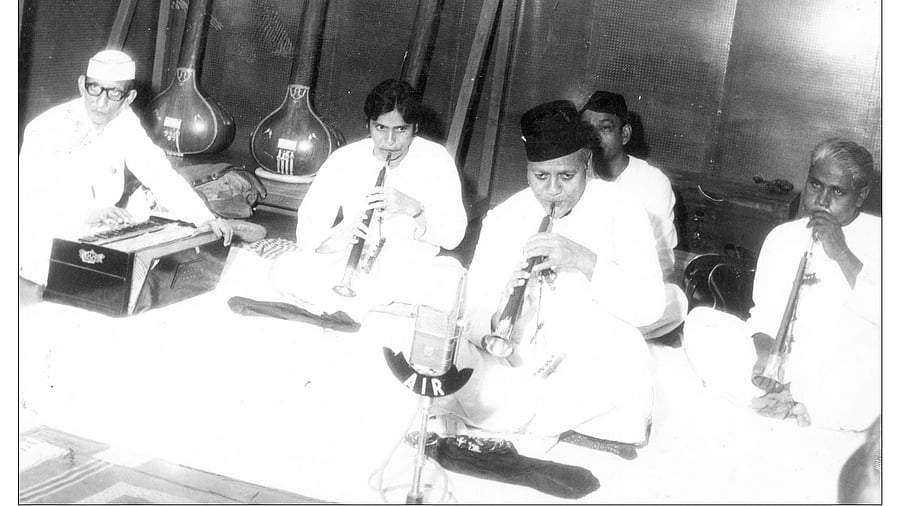
Ustad Bismillah Khan plays the shehnai with a troupe for an AIR Dharwad programme.
Photo Courtesy: All India Radio Dharwad
Over the decades, various cultural organisations and educational institutes have been crucial in shaping Dharwad as a cradle of classical music, art and literature. All India Radio Dharwad is one such key player, which is credited with the development of a ‘listening culture’ in the region.
Akashavani also popularised the concept of ‘Bahujana Hitaya; Bahujana Sukhaya’, (meaning ‘for the happiness of the many, for the welfare of the many').
Akashavani Dharwad is one of the first radio stations established in Karnataka. It was set up on January 8, 1950. This year, the station celebrated the 75th anniversary of its commissioning. The then Union Minister for Broadcasting, R R Diwakar, helped materialise the dream of having an All India Radio (AIR) station for north Karnataka. AIR Dharwad aimed at informing, educating, communicating and training, and soon became a ‘commoner’s university’ for knowledge sharing.
Today, it has grown to be a well-recognised public service broadcaster, like other famous AIR stations in Kolkata and Pune.
A retired accounts officer, 94-year-old Ramachandra Dhongade, has been an ardent listener since 1951. The Dharwad resident also started a franchise to sell radios, some 40 years ago. Renowned poets D R Bendre and Chennaveera Kanavi were the first to purchase the radios. “I love the content and presentation. I depend on the station as a credible source of information, and I enjoy receiving it in the typical north Karnataka Kannada,” Dhongade says.
Another passionate listener, Prabhakar Kore, the chairman of KLE Society in Belagavi, opines, “During my childhood, growing up in a remote village, the only entertainment was the radio. Today, I still depend on the morning broadcast and do not miss it while travelling in my car.”
Akashavani Dharwad features the voices of musical doyens, insightful thoughts of scholars in talks and interviews, segments on folk culture and literature, as well as traditional agricultural knowledge. There are also new segments that feature stories from other regions of Karnataka.
Keerti Nidagundi, a former programme executive, says, “A radio programme producer’s challenge is to be connected with the pulse, plan a mix of simple yet creative content and blend it with music, voice-overs and special sound effects to paint a picture in the minds of listeners from many age groups.”
Sharanabasava Cholin, present programme head at the station, adds, “After all, the human interest is what makes a programme different and popular. Akashavani Dharwad is known for hosting a variety of music genres, interviews, achievers from the region and informative programmes.”
There is also a digitised Akashavani library, which hosts interviews with Sir C V Raman, Field Marshall K M Cariappa, Shivaram Karanth, Masti Venkatesh Iyengar and other prominent personalities.
There are also speeches by Mahatma Gandhi, Jawaharlal Nehru, Indira Gandhi and Dr A P J Abdul Kalam, preserved for generations to come.
Sitar artist Ustad Shafiq Khan is now heading the music section at the station. The sixth-generation sitar artist studied under the tutelage of Ustad Rahimat Khan, now recognised as ‘Dharwad Gharana’ all over the world.
Recitals and instrumental performances have been digitised and uploaded on the station’s official social media platforms. This is, perhaps, why subscription is flourishing, with more than 3.5 lakh subscribers on YouTube.
Programmes like Smruti Samputadinda, Smruti Sangeeta and Nenapinangala, which featured stalwarts in the field of music, literature, folk arts and culture, have reached statewide listeners.
Some popular programmes have run for anywhere between 500 and 1,000 episodes.